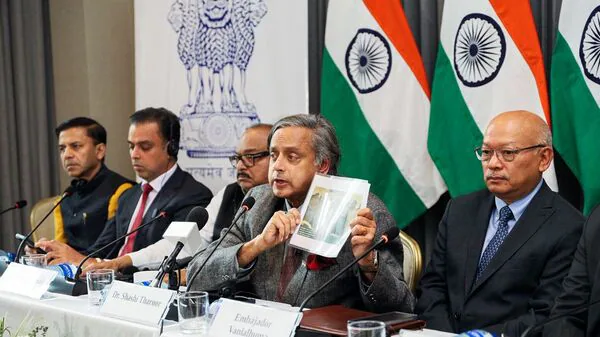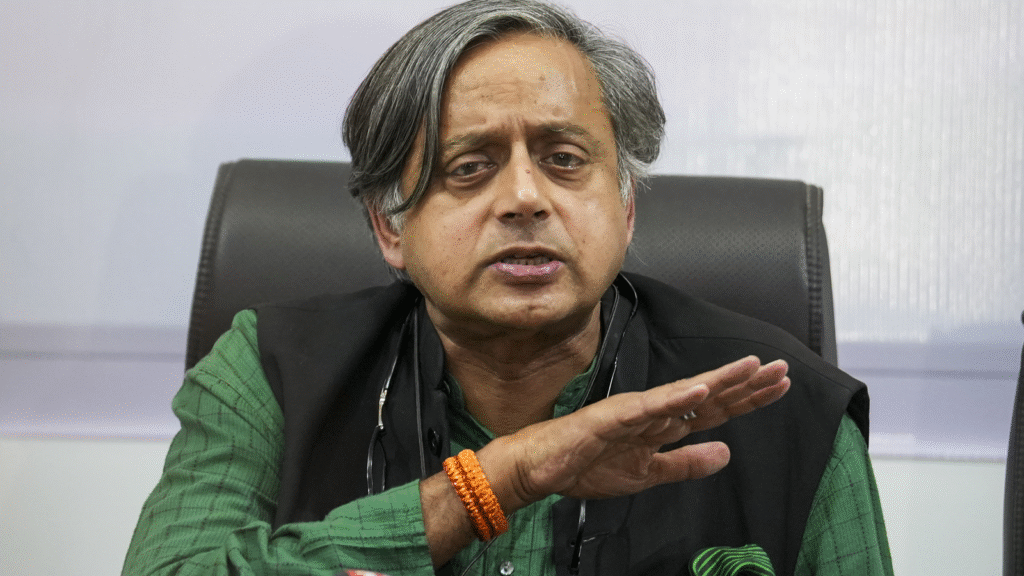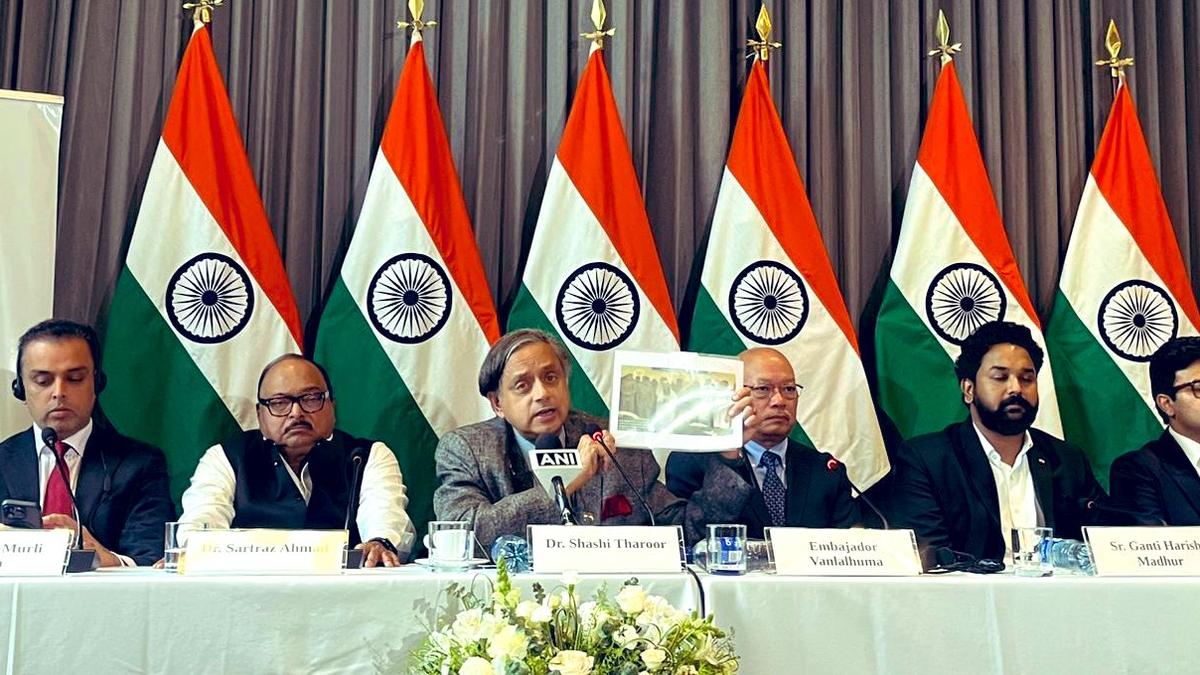
Introduction: A Diplomatic Win for India on the International Stage
In an important diplomatic development that has caught the attention of global political watchers, Colombia has officially withdrawn its earlier statement that appeared supportive of Pakistan’s position on a highly sensitive geopolitical issue. This retraction comes in the wake of a determined diplomatic intervention by an Indian delegation led by veteran politician and former diplomat Shashi Tharoor.
The incident marks a significant example of how direct diplomatic dialogue and assertive representation can influence international narratives. It also shines a spotlight on the evolving nature of global diplomacy where soft power, dialogue, and negotiation often outweigh confrontational rhetoric or unilateral declarations.
The initial statement by Colombia had seemingly aligned with Pakistan’s stance on Kashmir, a conflict that remains one of the most contentious and emotive issues between India and Pakistan. For India, the statement was seen not merely as a diplomatic oversight but as a challenge to its sovereignty and territorial integrity — red lines that India has consistently underscored in international forums.
Background: The Kashmir Conflict and Its International Dimensions
To fully grasp the significance of Colombia’s statement and subsequent withdrawal, it is essential to understand the broader context of the Kashmir conflict and its place in international politics.
Kashmir, a region nestled in the Himalayas, has been a disputed territory since the partition of British India in 1947. India and Pakistan, both nuclear-armed neighbors, have fought multiple wars over Kashmir and continue to have a fragile and tense relationship centered on this dispute.
India maintains that Kashmir is an integral and non-negotiable part of its territory, while Pakistan claims that the predominantly Muslim region should be allowed to determine its own fate. The issue is complex, involving historical grievances, ethnic identities, human rights concerns, and international law.
At the international level, both countries have engaged in diplomatic efforts to shape global opinion. Pakistan has particularly sought support from various countries to raise the Kashmir issue at international platforms such as the United Nations and the Organisation of Islamic Cooperation.
India, on its part, has worked diligently to assert its sovereignty over Kashmir, emphasizing the importance of bilateral resolution and condemning any external interference. It is within this charged atmosphere that Colombia’s original statement became a flashpoint.
Colombia’s Initial Statement: A Diplomatic Curveball
Colombia’s statement, which appeared to echo Pakistan’s narrative, was unexpected for several reasons. Traditionally, Latin American countries have maintained neutral or non-interventionist stances regarding the Kashmir conflict, focusing instead on their regional priorities.
The statement’s content reportedly included language that criticized India’s actions in Kashmir or supported Pakistan’s claims, which New Delhi viewed as a direct affront to its sovereignty. Though the exact wording has not been fully disclosed publicly, it was clear enough to prompt a swift and strong reaction from the Indian side.
In diplomatic terms, the statement represented a significant breach of the usual caution exercised by Colombia in international disputes far from its geographical region. Analysts suggest that this shift might have been influenced by Pakistan’s growing diplomatic efforts in Latin America, where Islamabad has invested in outreach programs aimed at garnering sympathy and support.
The move also highlighted the vulnerabilities of countries outside the primary conflict zones to becoming arenas for diplomatic competition and influence campaigns.
Shashi Tharoor’s Delegation: A Masterclass in Diplomacy
Faced with this diplomatic challenge, India responded swiftly and decisively by sending a delegation led by Shashi Tharoor, whose credentials as a former Under-Secretary-General of the United Nations and an experienced parliamentarian lend considerable weight to his diplomatic interventions.
Tharoor and his team engaged directly with Colombian government officials, emphasizing the importance of accurate representation and respect for India’s sovereignty. The delegation used a blend of historical context, legal arguments, and appeals to shared democratic values to persuade Colombian leaders to reconsider their position.
The discussions were reportedly conducted in a tone of constructive dialogue, emphasizing mutual respect and the importance of maintaining cordial bilateral relations. Tharoor’s approach reflected India’s broader diplomatic style — firm on principles yet open to engagement and persuasion.
This episode underscored the effectiveness of personal diplomacy and the importance of political leadership in international affairs, particularly when quick damage control is needed.
The Aftermath: Colombia’s Official Retraction and Its Significance
Following the diplomatic outreach, Colombia formally withdrew its previous statement, an action that speaks volumes about the responsiveness of governments to diplomatic pressures and the importance of maintaining good bilateral relations.
The retraction did not just correct a diplomatic misstep; it sent a clear signal about Colombia’s intent to avoid entanglement in complex South Asian disputes and its preference for a neutral stance. This move will likely help Colombia maintain better relations with both India and Pakistan, though it clearly aligns more closely with India’s diplomatic narrative.
For India, this was a diplomatic success, showcasing its ability to safeguard its interests through effective dialogue and engagement. It also serves as a precedent for how India might respond to similar situations in other parts of the world where Pakistan attempts to push its narrative.
Implications for Indo-Pak Relations and Regional Stability
The withdrawal by Colombia is more than just a bilateral issue; it carries broader implications for the fragile relationship between India and Pakistan, as well as regional stability in South Asia.
Pakistan’s diplomatic efforts to internationalize the Kashmir issue have been met with mixed success. While Pakistan continues to push for global attention and support, incidents like the Colombian retraction reveal the limits of this approach when confronted with well-organized Indian diplomacy.

India’s ability to effectively counter such diplomatic moves enhances its strategic standing and reduces Pakistan’s ability to isolate India on the international stage.
Moreover, the episode could serve as a warning to other countries contemplating statements or positions on Kashmir without fully understanding the sensitivities involved. It reiterates that international diplomacy requires nuanced understanding and respect for sovereignty and bilateral complexities.
The Role of Global Alliances and Emerging Geopolitical Trends
The Colombia incident also provides insight into the shifting nature of global alliances and the interplay of emerging geopolitical trends.
Latin America, historically distant from South Asian affairs, is gradually becoming a theater for influence and diplomatic contest, particularly as Pakistan seeks new avenues for international support. India’s response, through Tharoor’s delegation, is a testament to its growing global diplomatic reach and its ability to engage beyond traditional spheres.
This diplomatic tussle reflects the complexity of modern international relations, where local conflicts can have ripple effects far beyond their immediate region, affecting countries across continents.
It also highlights the importance of multilateral diplomacy and the roles that countries of all sizes can play in shaping international discourse. Colombia’s willingness to retract its statement after engagement from India suggests an appreciation for diplomacy that prioritizes dialogue and mutual respect over partisan positions.
Media Influence and Public Perception: A Battle of Narratives
The media coverage of Colombia’s retraction has been extensive and highly polarized, particularly in India and Pakistan, where the Kashmir conflict remains a dominant national narrative.
In India, the episode was widely hailed as a diplomatic triumph, with media outlets emphasizing the strength and effectiveness of Indian diplomacy. The narrative portrayed India as a responsible global player committed to defending its sovereignty through peaceful dialogue and strategic engagement.
Pakistani media, however, framed the incident as a setback but remained steadfast in their advocacy for Kashmir on international platforms. The incident has further intensified the media discourse around the Kashmir issue, highlighting how information dissemination and public perception are key battlegrounds in international conflicts.
International media have tended to focus on the diplomatic and geopolitical dimensions of the incident, analyzing it as a case study of how diplomacy operates in a multipolar world where regional conflicts have global resonance.
What This Means for Future Diplomacy: Strategies and Lessons Learned
The Colombian statement incident offers several important lessons for future diplomacy, particularly for countries engaged in complex international disputes.
For India, the key takeaway is the importance of proactive engagement. Waiting for issues to escalate or statements to become public controversies can be damaging. Instead, timely, direct, and respectful dialogue with concerned countries helps manage perceptions and prevent misunderstandings.
For countries like Colombia and other middle powers, the incident is a reminder to exercise caution before issuing statements on contentious international issues, especially when they involve deeply rooted conflicts in distant regions.
For Pakistan, the episode underscores the need for more credible and constructive diplomatic strategies. While raising awareness about Kashmir is central to Pakistan’s foreign policy, it must be done in ways that build alliances rather than alienate potential partners.
At a broader level, the incident reaffirms the value of diplomacy over confrontation. In a world where communication is instantaneous and political narratives can spread rapidly, dialogue remains the most effective tool for conflict resolution and international cooperation.
Conclusion: The Enduring Power of Diplomacy in a Complex World
The retraction of Colombia’s statement following intervention by Shashi Tharoor’s delegation exemplifies the enduring power and necessity of diplomacy in today’s interconnected world. It reminds us that despite the challenges posed by political conflicts, thoughtful engagement, mutual respect, and strategic communication can pave the way for understanding and cooperation.
India’s success in this episode reinforces its role as a mature and influential global actor, capable of protecting its interests while fostering peaceful international relations.
For the international community, the incident serves as an important example of how smaller nations can and do play significant roles in global diplomacy, often becoming critical actors in broader geopolitical narratives.
As global politics continue to evolve with shifting alliances and emerging powers, such diplomatic victories will be crucial in promoting stability, peace, and respect for sovereignty across regi

